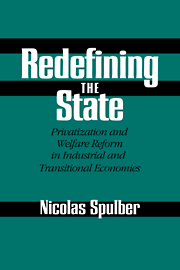Part III - Comparisons Within Broader Frameworks
Published online by Cambridge University Press: 29 March 2010
Summary
This part places the various changes undergone in the industrial countries and in the former Soviet Russia with regard to privatization, welfare, and their respective connections to the state's agenda into two broad frameworks: for the West European countries considered, the framework is the group of the most advanced industrial countries, the G7; for the Russian Federation, the framework is Eastern Europe, comprising both Russia and its former East European satellites.
To begin with, I point out in Chapter 5 that the debates on the state's size and functions – which I presented in detail in Part II – are predicated on certain basic theoretical assumptions concerning the factors that determine changes in output and employment and on how these changes affect the state's agenda. In this regard, the opposition between classical economics and Keynesianism (and between their respective current offshoots) reflects vastly different views on “activist” governments and, accordingly, on the types of functions assumed by the state. To illustrate the point I present the U.S. agenda – as embodied in federal budget data – both as it might have been constituted on the basis of the classical theory and as it has actually evolved as a function of sociopolitical pressures, the requirements of economic growth, and the amplitude of technological change. A simple comparison shows that within the classical framework the state agenda would be reduced to two narrow blocks, namely general government and defense, while the modern agenda adds a variety of activities concerning economic development and social protection.
- Type
- Chapter
- Information
- Redefining the StatePrivatization and Welfare Reform in Industrial and Transitional Economies, pp. 133 - 134Publisher: Cambridge University PressPrint publication year: 1997



